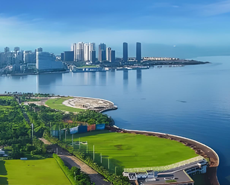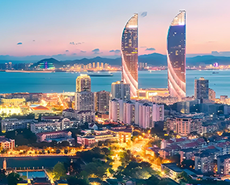
Peak Resources: The electrification of our society to be the catalyst for NdPr price increases
----Interview with Michael Prassas
GM of Sales & Marketing
Peak Resources Limited
GM of Sales & Marketing
Peak Resources Limited
Peak Resources Limited, who aims to be one of the lowest cost players in the industry, focuses on developing their 100% owned Ngualla Rare Earth Project in Tanzania at present and plans to produce rare earth carbonate in Tanzania and process the carbonate in U.K. Ngualla Project owns a total resources of 214.4 million tons with 2.15% REO, for 4,620,000t of contained REO. The mine life is 26 years. The company plans to export about 32,700t of rare earth carbonate with 45% REO per year.
Asian Metal: Thanks for accepting the interview of Asian Metal, Michael! Would you please give a short introduction of your company and your Ngualla Rare Earth Project?
Michael: Peak Resources is an Australian stock listed company aiming to become one of the lowest cost producers in the Rare Earth industry. With an experienced and dedicated management team, Peak is developing the Ngualla rare earth mine in Tanzania and the UK rare earth refinery in Teesside into a low cost, next generation Neodymium and Praseodymium (NdPr) Rare Earth project.
Asian Metal: Would you like to introduce your Ngualla Rare Earth Project?
Michael: The Ngualla Rare Earth project is situated 147km from the city of Mbeya on the edge of the East African Rift Valley in Tanzania. It is one the world’s largest and highest grade undeveloped NdPr rare earth projects worldwide.


Asian Metal: May I know what do you think as the distinct advantage of your Ngualla Rare Earth Project?
Michael: Ngualla’s superior mineralogy combined with the Tees Valley Refinery in the UK, gives it a distinct advantage over other rare earth projects globally. Ngualla makes Peak the lowest operating and capital cost project of any comparable fully integrated rare earth developer.
Tees Valley, The UK-Wilton International Site, is where we plan to build our rare earths refinery is what we call a “plug and play” solution. It is close to our European markets where we aim to sell our lower value cerium and lanthanum products.
The site offers great infrastructure and features such as operating in an industrial park next to the 3rd largest UK port, onsite supply of cost competitive bulk chemicals, an onsite power plant, access to a highly educated and trained labour force, local and national government support, a corporate tax rate of 18%, available waste disposal and treatment facilities, all of which allows us to significantly reduce our capex. So overall, a real competitive package. The site is ready to go – fully permitted for construction and operation.
Peak has an estimated breakeven cash cost (before royalties, interest, tax, depreciation and amortization) threshold of just US$32.24 per kg of NdPr oxide produced. This threshold is purely derived from our NdPr production, with none of the other product stream revenue factored in (total annual project OpEx of US$ 91miliion for the complete operation divided by our annual NdPr output of 2,810tpa.)

This calculation does not take into account the 10,000tpa of lanthanum and cerium carbonates, or the 625tpa of SEG and mixed heavy carbonates, that will be produced as “by-products" from Ngualla. If we include those then we would reach a ballpark of the low twenties dollars for breakeven cash cost for 1 kg of NdPr oxide.
To our knowledge, this is the lowest breakeven price of any fully integrated rare earth development project, placing us in the lower cost quartile of current producers worldwide. These numbers really demonstrate the quality of the project and refinery setup in the UK.

Asian Metal: Would you please share your opinion about what the major challenges are to develop a rare earth project?
Michael: Each rare earth deposit is different, so the approach needs to be specific to the deposit. Important attributes that contribute to project success include resource mineralogy, grade, reserve size, metallurgical amenability, and content of deleterious impurities. Positive attributes in these areas, coupled with significant piloting to optimize process, strong engineering focus on simple and functional operational design, increase viability of the project.
Several members of Peak Resources’ management team has extensive rare earth experience, including our CEO, former Managing Director of Mountain pass in the US, Rocky Smith and myself, who joined Peak from Rhodia/ Solvay rare earth systems, one of the biggest non-Chinese rare earth players world-wide.
We believe to be successful, the company needs to focus on development of the strongest team possible. The operations readiness efforts, that start two years in advance of the actual operation, focuses on every aspect of the business. Hiring and enabling a strong core group and building out with highest level energy and intellect of individuals available. History has taught, with the example of Lynas and Molycorp, that building such assets is anything but easy. It requires experienced people and 100% focus to make it a success.
Furthermore we have learned from industry examples that it is important to break the paradigm of the mining industry. We need to manage the project to come online and to be in production before the next commodity cycle will start.
This will allow us then to develop a healthy balance sheet with robust returns, which ultimately will enable us to continue to execute our corporate strategy by getting further integrated into the value chain and circular economy.
Asian Metal: As far as I know, you are waiting for Tanzanian government's approval of the special mining license ("SML" for short) of Ngualla Rare Earth Project. Would you like to share some details?
Michael: In 2018 we received the planning permission for our UK refinery and our environmental permit from the UK environment agency. As a result, our UK refinery site is now fully permitted and ready to go as soon as the project funding is secured.
The next important catalyst for Peak Resources is to receive the last pending permit, the special mining license (SML) in Tanzania. We believe that an important milestone for the Tanzanian mining industry will be achieved when the Tanzanian government and Barrick conclude the deal on the Acacia acquisition and dispute resolution. Our understanding is that these conversations and negotiations are quite advanced.
Asian Metal: Chinese PrNd oxide market is witnessing increasing offers now as major producers, who believe current prices are not high and the tight supply of ionic rare earth concentrate would support the price in the near term, and keep rising the quotations to test the market. May I know your anticipation of PrNd oxide prices trend in the near term?
Michael: The NdPr price has experienced some volatility during the last 2 quarters, mainly driven by the ongoing US-China trade dispute which we continue to follow as it could be significant game changer if China does decide to implement some significant changes which could impact the global rare earth business. It will be also interesting to see how Lynas continues to operate in the market.
Besides that, our understanding is that the overall supply and demand situation for light rare earth is still intact and in balance, although the Chinese supply chain reforms had an immediate direct impact on the rare earth imports from Myanmar. This triggered price increases since May on the heavy rare earth side of the business and in particular for Terbium and dysprosium-oxide.
Overall, in the short and mid-term we are expecting that the market will continue to experience high volatility.
Asian Metal: Would you like to share your opinion about PrNd oxide demand trend in the coming years?
Michael: The electrification of our society will be the catalyst for NdPr price increases as a result of the fast growing E-mobility sector. Many people are unaware that nine out of ten mobility applications that use a lithium-cobalt-graphite battery are also using an NdPr permanent magnet motor. With each of these motors representing a minimum incremental demand of approximately of 1kg NdPr oxide, the math speaks for itself!
The requirement for magnetic motors and NdPr is perhaps one of the biggest blind spots in today’s global commodity market. To meet the predicted demand increase, several rare earth projects like Ngualla would need to come into production by 2022-24.
We expect that by 2021-2022 we shall see a very different rare earth pricing landscape. We believe that Neodymium and Praseodymium will be in high demand over the next decade along with price increase underpinned by genuine, increased industrial demand. It will be interesting to see how the market will handle this transition.
Asian Metal: Participants pay close attention to new energy vehicles industry now. May I know how do you think about the development prospects of new energy vehicles?
Michael: We are bullish on the NdPr market outlook for the next decade. Obviously EVs are the fundamental disrupter driving this scenario. For example, In June 2019, Toyota Motor Corporation announced it is to accelerate its electric vehicle strategy. Toyota aims to get half of its global sales from electrified vehicles by 2025. This is five years ahead of its previous schedule.

The global automotive industry led by car manufacturers, have jointly committed to a US $400 billion investment in Electric vehicles. The market expected to nearly quadruple the availability of electric vehicle models.
For example, in the automotive sector we can see three major waves of product launches for new electric vehicle platforms in the future. The first wave will reach the market by 2020 with close to 200 new energy vehicles available in dealerships, followed by the second wave in 2022 and then by the final and third wave in 2025. By 2025 all car manufacturers will have a comprehensive and complete new energy vehicle range in the market, equivalent to the diversification of the internal combustion engine product portfolio today. At that time I anticipate that the electric vehicle segment will represent 15-25% of the global annual passenger car sales, equating to approximately 15-25 million electric vehicles sold every year.
















